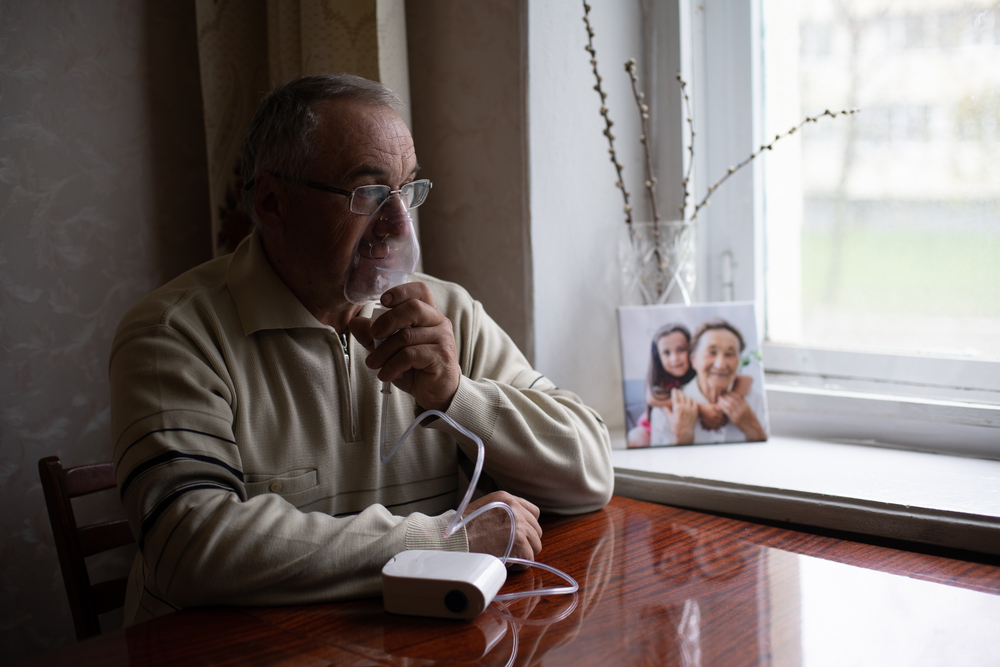Emphysema Life Expectancy
Category:

Emphysema is a respiratory disease caused by permanent damage to the lungs that makes it hard to breathe. The most common cause of emphysema is being a long-term smoker, with about 15% of smokers being diagnosed in their 40s and 50s.
Because most sufferers are older adults with a history of smoking, many common signs of emphysema like deep coughs that produce mucus, wheezing, and shortness of breath may be ignored. In this post, we’ll break down what to expect with emphysema, highlight symptoms to look out for in your loved ones, and answer common questions like “How long can a person live with emphysema?”
Download Our FREE Path to Care Guide
Signs of Emphysema
During early stages of emphysema, most patients will have few symptoms, and the disease usually progresses slowly. According to Harvard Health, the average person will not experience symptoms until they have smoked a pack of cigarettes per day for more than 20 years.
Usually, patients start to notice something is wrong when they start developing shortness of breath that worsens over time. Other symptoms of emphysema include:
- Difficulty catching breath after physical exertion
- A deep cough that produces mucus
- Wheezing
- A whistling noise when air is inhaled
- Tightness in chest
- Difficulty sleeping
- Constant Fatigue
- Headaches
- Difficulty Sleeping
- Swelling in the feet, ankles, or legs
- Weight loss
Can You Die From Emphysema?
Complications from emphysema can cause death. Patients with certain genetic or chronic conditions are more likely to encounter life-threatening complications. These include:
- Alpha-1 antitrypsin deficiency (A1AD)
- Asthma
- Heart disease
- High blood pressure (hypertension)
- Diabetes
- Bronchiectasis, a rare condition that causes irreversible damage to the lung’s airways
How Long Does Emphysema Last?
Unfortunately, there is no cure for emphysema. Once your lungs are damaged, there is no way to reverse it, but treatment can help relieve symptoms and minimize disability. Quitting smoking can help prevent the disease or slow its progression.
Emphysema Life Expectancy
Average life expectancy with emphysema varies depending on the severity of the disease and how much sufferers adjust their lifestyle after a diagnosis.
People with mild emphysema who quit smoking have a normal life expectancy. Patients who adopt a healthier lifestyle can enjoy a normal quality of life for a long time — even those with severe emphysema have a good chance of surviving for another five years with proper management.
People with emphysema who continue to smoke may reduce their lifespan by 10 years or more.
Long Term Prognosis for Emphysema
Though there is no cure, treatments and lifestyle changes can help prevent emphysema or prevent it from worsening. Lifestyle changes include quitting smoking or vaping and avoiding secondhand smoke, air pollution, chemical fumes, or excessive dust.
Your doctor may also prescribe medications to assist breathing, loosen thickened mucus, and reduce inflammation in the lungs.
Therapies like supplemental oxygen for those whose blood-oxygen levels fall below 88% or pulmonary rehabilitation which teaches breathing exercises and techniques to combat shortness of breath may also help.
If all else fails, surgery to remove or repair damaged tissue may be an option for those with severe emphysema.
To learn more about our home care services, contact our caregiving team today at 1-800-GRISWOLD or find a Caregiver near you.
Subscribe
Date: 2024-11-07
Category:


